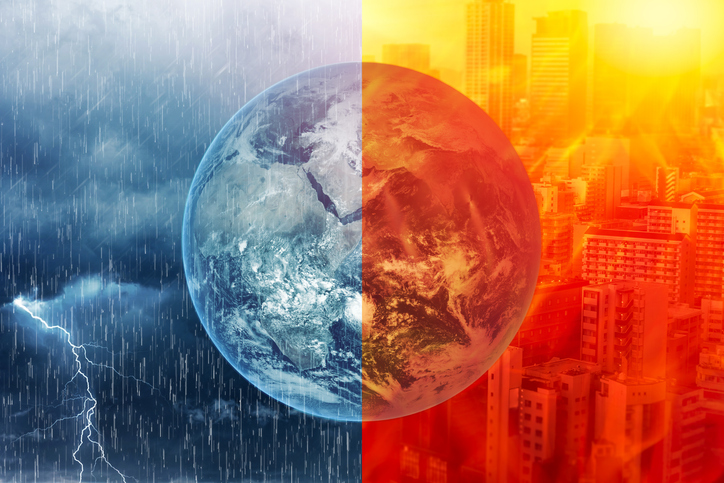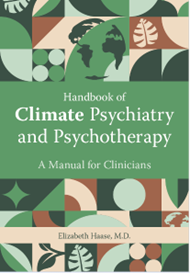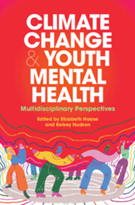Q&A on Climate Change and Mental Health with Elizabeth Haase, M.D.
Elizabeth Haase, M.D., former chair of the APA's Committee on Climate Change, shares some insights and advice for coping with its mental health effects. Haase is the author of the new book from APA Publishing, “Handbook of Climate Psychiatry and Psychotherapy” and is the Medical Director of Psychiatry for Carson Tahoe Hospital and Behavioral Health Services in Carson City, Nevada and a clinical professor of psychiatry at the University of Nevada School of Medicine. She is also chair of the Climate Committee for the Group for the Advancement of Psychiatry and co-editor of “Climate Change and Youth Mental Health.”

Your new book explores how extreme heat affects our mental health. What are some of the most common psychological impacts people experience during heatwaves?
Most people enjoy the heat up to about 80°F, depending on humidity and so on, and just feel more cranky in extreme heat—more negative emotions and what psychiatrists call “dysphoria.” But as temperatures become more extreme, there is a very significant increase in violence (estimated at 4-14% per °C) reflected in more crime, group conflicts, and so on. Suicide rates creep up steadily with rising temperatures.
Are there particular groups—such as children, older adults, or certain cultural communities—who are more vulnerable to heat or other climate-related mental health challenges?
The people who need to be especially careful in the heat are people over 65; those with dementia, substance use disorders, major psychiatric illnesses, particularly schizophrenia; and people who take medications that change neurological and vascular responses to the heat, such as psychiatric medications, beta blockers, and medicines for bladder function. Older people are particularly vulnerable. Other vulnerable groups include children, farm workers and other outdoor workers, and women in cultures where they wear large amounts of clothing or have a greater deal of outdoor work responsibility.We’re hearing more about “eco-anxiety” and climate-related stress. How do worries about new diseases or germs, possibly linked to climate change, affect people’s mental well-being?
When experts talk about how infectious diseases are changing and increasing with climate change, they often don't discuss how frightening it is for most people to think that there is an invisible infectious threat that could make them sick. We know from the history of polio, COVID, and other epidemics, that people dramatically change their behaviors when they have this kind of worry, and can become over-anxious, over-compulsive about cleaning, and preoccupied with the threat of infection.
Food insecurity is a growing concern as climate change disrupts agriculture. What are some of the unique mental health effects and emotional and cultural responses in communities facing food shortages?
Food has such an extraordinary amount of cultural meaning. It is part of what connects you to your family, makes you feel like all is right with your life when you can sit down to a nice dinner, and so on. Nowadays we also expect to have good quality food. Food shortages, especially for foods tied up in people’s sense of identity, can create all kinds of social problems beyond just the nutritional effects of inadequate food—riots, like the Tortilla Riots in Mexico in 2007 when there was a doubling of the price of tortillas during a corn shortage—national and international conflict and the rise of more authoritarian governments, or like the Syrian war that started in part due to people from rural areas headed for the cities during a drought and the government destabilized. Just the distress of not being able to have eggs or toilet paper can really stress people, and challenge their sense of safety and identity, as when parents can’t feed their children.
How do you see the role of psychiatrists and mental health professionals evolving as climate change becomes a more prominent factor in people’s lives?
Psychiatrists really need to get more involved with public health roles, and help officials understand the psychological consequences of policy decisions, which so often get left out. They also need to help their patients connect the dots between climate change and physical and health problems, and empower them to take action—particularly action to prevent further global warming.
What are some signs that someone might be struggling with climate-related stress or anxiety, and when should they seek help?
As far as we know at this point, people who are really struggling clinically with climate distress have the same kind of symptoms of anxiety and depression as the rest of the population, in about the same proportions—so poor sleep, grades or work performance falling, inability to focus on anything else, and feeling suicidal can be concerns. But still, 80% of young people are really worried about this, and worried about their futures, and that can show up as feeling demoralized and hopeless about working towards goals in school or acting out sexually or with drugs because “it doesn’t matter” what will happen, or anger.
How can individuals and communities build resilience to cope with the mental health impacts of climate change?
There is a long list of things communities can do to be prepared such as mapping the organizations that can offer food and shelter and other “assets” of the community, advance planning for phone trees and pharmacy backups, and so on. Psychologically, though, the most important things are to be grounded, present, and connected so you can respond optimally to rapidly changing conditions. Communities can help people with this by providing skills—like deep breathing, practicing mindful attention to details of the moment—and explaining to people how these can help them in a disaster or under prolonged stress.
What advice would you give to parents or caregivers who are worried about how climate change might affect their children’s mental health?
Look, it’s hard to say it any other way: We have to stop using fossil fuels wherever possible—whether plastics, transportation, or wherever—all together, right now, no matter what it takes. We have all the tools we need to build a sustainable clean world populated by the marvelous creatures of creation. We just have to stop using fossil fuels, and parents have to make that happen through political action, and through adopting new practices in their lives and in their jobs and businesses. Kids who see their parents taking action do well. Parents can also make space for an open-ended conversation and not deflect the negative emotions of children out of their own guilt or discomfort with strongly expressed feeling.
As we head into the peak of summer heat and hurricane season, what practical steps or resources do you recommend for people who want to support their own mental health?
The most important things are to have a go kit that contains emotionally laden items as well as paperwork, water, medications, and so on, and more than anything else, to PRACTICE IN ADVANCE. Quiz yourself and your family about the speed and qualities of a tornado. Run drills for getting out of the house in under 2 minutes. In these situations, your mind can become cloudy. People can also calculate their own carbon footprint and commit to one small change they will make. Summer is a particularly easy time to cut back on heavy meat and potato meals.


